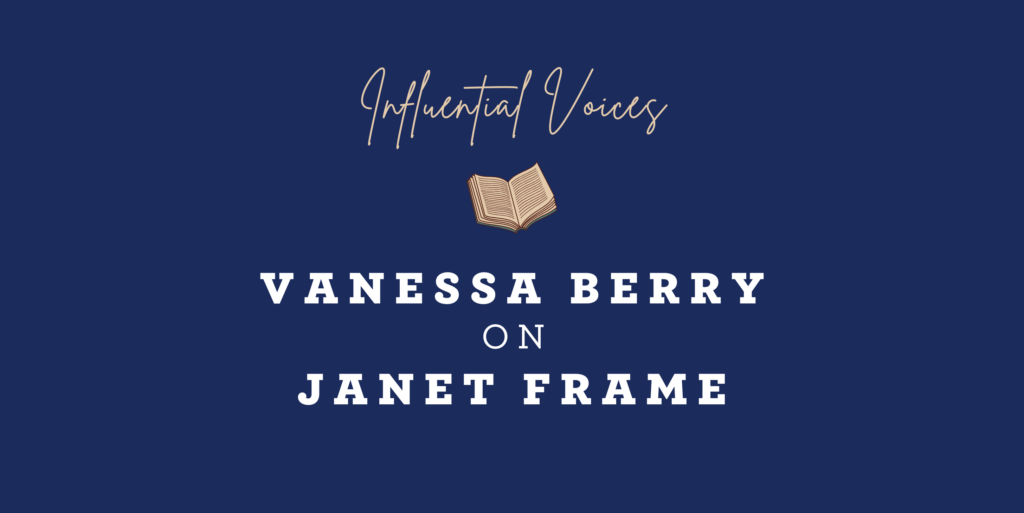
The Paladin paperback editions of Janet Frame’s three-volume autobiography — To the Is-Land, An Angel at My Table and The Envoy from Mirror City — became familiar to me from browsing in secondhand bookstores. Their topsy-turvy cover illustrations already looked dated, ten years after their 1987 release, and with youthful censure I passed over them many times.
What finally motivated me to read them was a detail as secondary as the cover illustrations: the author’s name. What better name can a writer have than Frame? Reading them I found, as frame suggests, I could look through her eyes and inhabit her way of being in the world. Although she was writing about a life far removed from mine — growing up in a poor family, in a small town in New Zealand in the 1930s — I felt as if I too was included in it, a ghost in the corner, while her family life continued. I recognised much in her shy, wondering self. I was 20 years old and still transforming from the introverted misfit of a girl I had always felt myself to be. Frame’s autobiography enshrined the experience of being awkward and bookish, where home is a kingdom and the world outside of it can be difficult to negotiate.
Growing up in a working-class family, Frame’s expected trajectory in life was to become a teacher. Her autobiography shows how few options were available to working-class women, regardless of their intelligence, resourcefulness and curiosity. Before Frame’s teaching training was complete, she abandoned it. The next phase of her life began with an erroneous diagnosis of schizophrenia that saw her institutionalised off and on for eight years, during her twenties. Scheduled for a lobotomy operation, she was saved from this fate when she won a literary prize for her book of short stories, The Lagoon, and became recognised as a talented writer. She went on to write twelve novels and a number of collections of short stories and poetry, as well as her autobiographies.
An intensely private person, Frame avoided interviews and the public eye, hoping that her writing would stand for itself. Her reclusiveness only made people more curious about her, and more inclined to read her novels as factual. Frame held strong beliefs about the distinction between autobiography and fiction. She maintained, for example, that while her novel Faces in the Water was based on her experience in institutions, it was a work of fiction and should be read as such. It was not until the 1980s, when Janet was in her sixties, that she wrote her three-volume autobiography as a way of setting the record straight.
My experience of reading Frame’s novels was enriched by having read her autobiography first, understanding her life story. Despite her reluctance to be scrutinised, it is the combination of Frame’s identity as a writer and her writing itself that I have found most inspiring. A shy, reclusive person, she had an internal world full of treasure that is revealed through her books.
Reading Janet Frame is to enter a world of animated detail. No person, place or thing is ordinary; all is worked into a web of significance. This way of imagining the world can be equally revelatory and dangerous. Our day-to-day lives are full of things that do not fit, and it is only our imaginations that work to bind them together. This power of the individual imagination to create meaning and narrative is a strong presence in all Frame’s writing.
By the time of her death in 2004, at age 79, Frame had become one of New Zealand’s most well-known writers. She remained reclusive her entire life; in an ABC radio documentary, New Zealand writer C.K. Stead described her: ‘she was very shy, and she was very strange.’ Her anonymity would have been somewhat difficult to maintain in New Zealand, as she would have been easy to recognise by her unruly hair. In the film version of An Angel at My Table, directed by Jane Campion and released in 1990, Frame’s orb of red hair became iconic.
Last year I visited the house at 56 Eden St, Oamaru, where Frame lived as a child. Standing in the small cottage, which has been restored for literary pilgrims such as myself, I felt a curious sensation. This house had been made so vivid in her writing that the possibility of it being real hadn’t occurred to me until this moment. Feeling the stories within everything around me, I felt a great love for all the shy and strange people of the world and the hidden treasure that is imagination.
About the Writer
Vanessa Berry lives and works on Gadigal land. In her books, essays and zines she examines expressions of memory, particularly connected to places and objects. She is the author of four books, most recently Gentle and Fierce (2021), a memoir about human and animal relationships, and the award-winning Mirror Sydney (2017), about urban environments and change, based on the popular Mirror Sydney blog. She is the author of the long-running autobiographical zine series I am a Camera and her zine and illustration works have been exhibited at major Australian galleries. She is a Lecturer in Creative Writing at the University of Sydney.
More from Writing NSW
Check out our full range of in-person writing courses in Sydney, our online writing courses and our feedback programs to see how we can help you on your writing journey. Find out about our prizes and opportunities, as well as writing groups across NSW, and sign up to our weekly newsletter for writing events, opportunities and giveaways.
